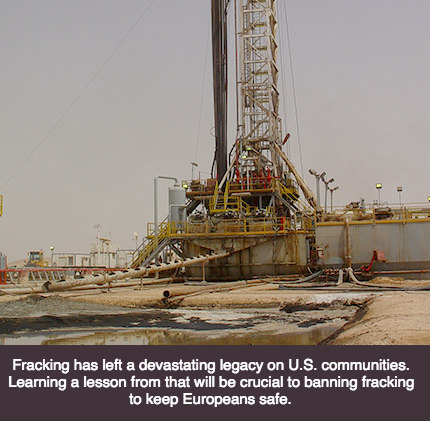By Andy Gheorghiu and Frida Kieninger
 In November 2016, the EU-Commission organized a “workshop on public health impacts and risks resulting from oil and gas extraction.” Behind this title are mainly questions around fracking and a hesitant attempt by the Environment Directorate General (DG ENV) – historically the most supporting part of the Commission concerning environmental issues – to find out more about its impacts on public health.
In November 2016, the EU-Commission organized a “workshop on public health impacts and risks resulting from oil and gas extraction.” Behind this title are mainly questions around fracking and a hesitant attempt by the Environment Directorate General (DG ENV) – historically the most supporting part of the Commission concerning environmental issues – to find out more about its impacts on public health.
Scientists from the U.S. and Europe, as well as industry representatives and NGOs, had their say at the workshop. While the public health impacts of oil and gas extraction though fracking in the U.S. have been analyzed in several studies, most were sponsored by the oil and gas industry and are seriously biased towards its interests. Nonetheless, there is an enormous amount of evidence that fracking negatively affects public health, as confirmed and acknowledged by this compendium of scientific, medical and media findings.
However, authorities still think that there is a lack of data. This is mainly due to the public’s dependency on industry to obtain information about fracking chemicals, injection mixtures, amounts, and due to the absence of much needed baseline studies, measuring indicators before hydrocarbon production.
But whatever the possible reasons for data gaps, in the meantime, uncertainty about the safety of fracking should in no way lead to fracking operations moving ahead in Europe. Quite the contrary: The precautionary principle laid down in the EU treaty and the wide range of already existing and alarming data from the U.S. leaves no other conclusion—the only appropriate solution is a ban on any fracking activities, in Europe and elsewhere.
Public Health England, also speaking at the workshop, however, states: “hydraulic fracturing is safe provided it is properly regulated.” This is an argument regularly repeated by pro-fracking advocates. But the lack of experience with fracking in the UK with its different geological conditions, more densely populated areas and the issue of wastewater treatment and regulation shows that the country is far away from the (unreachable) goal of “safe fracking.”
While in the UK no stone is left unturned to help frackers succeed, the conclusions of the Irish Environment minister are different. After the U.S. EPA (Environmental Protection Agency) study on the impacts of fracking on drinking water found that there is too little information available to ensure health protection, he indicated that this justifies an ongoing prohibition on fracking in Ireland.
Health impacts of fracking
But what, concretely, are the health impacts of fracking? Gas extraction, corresponding gas infrastructure and other gas-related facilities need to be taken into consideration.
Stressors such as financial damages, traffic and noise exposure, as well as the psychological stress caused by being denied information and having no recourse to complain contribute to the mental health issues associated with fracking.
Air pollution, chemicals and chemical combinations in waste water, impacts from waste disposal sites and water contamination have documented impact on the health of US communities. The issue of waste water has also been analyzed by the German Helmholtz Zentrum. Fracking boomtowns with large influxes of male workers have also been shown to experience rises in sexually transmitted diseases and traffic accidents. Last but not least, climate change boosted by unconventional gas extraction and resulting high methane emissions is already impacting public health. Extreme weather patterns and the rise of waterborne and vector-borne diseases are just some of many health impacts resulting from climate change.
Gas extraction has also left its marks in Europe
While there is no proven causal link between hydrocarbon extraction and a cancer cluster in the northern German Land of Lower Saxony, the case is striking: Significant increases of leukemia, lymphoma and myeloma were identified in municipalities close to extraction sites, on which also fracking is used. While officials still lament a lack of exposure data particularly on benzene, the population is living with the continuing fear of abnormally high cancer rates. During the workshop, FWE pointed out that the green-led agricultural ministry
in Lower Saxony even denies the implementation of the mandatory Strategic Environmental
Assessment Directive. Moreover, FWE stressed that it’s up to the competent authorities to restore and enhance public trust through providing at least the minimum of protection by respecting existing regulation.
What’s clear is that there are still a number of unknowns around fossil fuel production that cannot be ignored. There is no doubt that fracking has left a devastating legacy on U.S. communities. And learning a lesson from the United States will be crucial to banning fracking to keep Europeans safe from respiratory diseases, mental health issues, carcinogenic chemicals and other harms.


